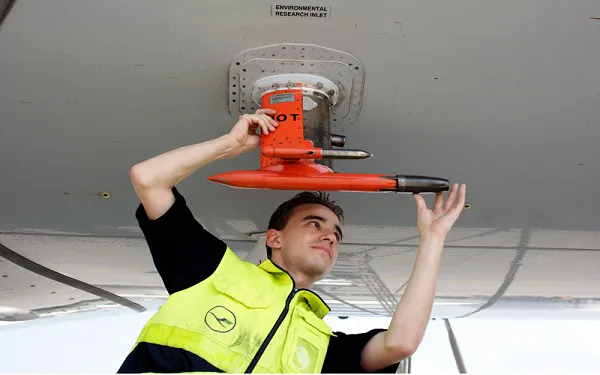
Lufthansa flies high with climate science.
Dec 31, 2019

Lufthansa is taking significant strides in addressing climate change by integrating advanced climate science into its operations. The airline is committed to reducing its carbon footprint through innovative technologies and sustainable practices. By investing in fuel-efficient aircraft and exploring alternative fuels, Lufthansa aims to minimize greenhouse gas emissions. Additionally, the airline collaborates with researchers and environmental organizations to enhance its understanding of climate impacts. Their comprehensive approach not only focuses on immediate operational improvements but also emphasizes long-term sustainability, positioning Lufthansa as a leader in the aviation industry's efforts to combat climate change while maintaining high standards of service.
Lufthansa's Commitment to Climate Science
Lufthansa, one of the leading airlines in the world, has been making significant strides in addressing climate change through innovative climate science initiatives. The airline is dedicated to reducing its carbon footprint and enhancing sustainability in aviation. With a focus on advancements in technology and operational efficiency, Lufthansa is setting an example for the industry.
Innovative Technologies in Aviation
One of the key areas where Lufthansa is investing is in "innovative technologies" that promote environmental sustainability. The airline has been actively involved in research and development aimed at creating more efficient aircraft engines and alternative fuels. By collaborating with various stakeholders, Lufthansa is paving the way for a greener future in aviation.
For instance, the airline has been a part of several projects exploring the use of "sustainable aviation fuels (SAFs)", which can significantly reduce greenhouse gas emissions compared to traditional jet fuels. Lufthansa aims to increase the share of SAFs in its fuel mix, demonstrating its commitment to climate science and environmental responsibility.
Operational Efficiency and Flight Optimization
Another critical aspect of Lufthansa's strategy is enhancing "operational efficiency". The airline employs advanced flight planning systems that optimize flight routes and reduce fuel consumption. By utilizing "big data analytics", Lufthansa can analyze flight patterns and weather conditions to minimize fuel usage and emissions.
| Strategy | Impact |
|---|---|
| Flight Route Optimization | Reduces fuel consumption and emissions |
| Use of Sustainable Aviation Fuels | Decreases greenhouse gas emissions |
| Advanced Aircraft Technology | Improves fuel efficiency and performance |
Partnerships for Climate Action
Lufthansa recognizes that addressing climate change requires collaboration across the aviation industry. The airline has partnered with leading organizations and regulatory bodies to promote "climate action" and establish industry-wide standards for reducing emissions. These partnerships facilitate the sharing of best practices and foster innovation in sustainable aviation.
Through its involvement in initiatives such as the "Air Transport Action Group (ATAG)" and the "International Air Transport Association (IATA)", Lufthansa actively engages with other airlines and stakeholders to advocate for policies that support sustainable aviation. These collaborations are essential for driving systemic change and achieving long-term sustainability goals.
Carbon Offset Programs
In addition to reducing emissions through technology and operational improvements, Lufthansa offers "carbon offset programs" that allow passengers to compensate for their flight-related emissions. By investing in projects that contribute to renewable energy, reforestation, and community development, Lufthansa empowers its customers to actively participate in climate action.
Passengers can easily contribute to these initiatives during the booking process, making it simple for travelers to make environmentally conscious choices. This approach not only helps mitigate the impact of air travel but also raises awareness about the importance of sustainability.
Future Goals and Sustainability Targets
Lufthansa has set ambitious goals for the future as part of its commitment to climate science and sustainability. The airline aims to achieve a "net-zero carbon footprint by 2050", aligning with global climate targets and demonstrating leadership in the aviation sector. To reach this goal, Lufthansa is focused on several key areas:
- Investing in new, fuel-efficient aircraft
- Increasing the use of sustainable aviation fuels
- Enhancing operational efficiency through technology
- Engaging in partnerships for climate action
Conclusion
Lufthansa is soaring high with its commitment to climate science and sustainability. Through innovative technologies, operational efficiency, partnerships, and carbon offset programs, the airline is taking meaningful steps to reduce its environmental impact. As the aviation industry faces increasing scrutiny over its contributions to climate change, Lufthansa stands out as a leader, demonstrating that it is possible to balance air travel with environmental responsibility.
As consumers become more environmentally conscious, airlines like Lufthansa that prioritize sustainability will likely attract a loyal customer base. The airline's proactive approach to climate science not only benefits the planet but also enhances its reputation as a responsible and forward-thinking airline.
Related Articles

Explore Thailand: The Best Islands to Visit for Paradise, Adventure, and Relaxation

The Ultimate Guide to the Best Islands in Thailand for Your Next Getaway

Do babies need passports? How to get a passport for a newborn

How to get a U.S. passport fast: here’s how to expedite the process

What is Mobile Passport Control: 5 reasons why you should use it

SENTRI vs. Global Entry: A detailed guide

Do you need a passport to go to the Bahamas? Let’s find out

Do you need a passport to go to Mexico? A detailed guide

Do you need a passport to go to Canada? We got the answer

Do You Need a Passport for a Cruise: An Essential Travel Guide

Booster Seat Requirements: All the Rules to Follow in Your Rental Car

What Are the World’s Most Powerful Passports, and How Does Yours Rank?

How to Take a Passport Photo at Home: A Helpful Guide

You've got to have heart! Southwest's new livery

Your opinion: Should water be free on low cost carriers?

Young women bolder than guys as solo travellers
